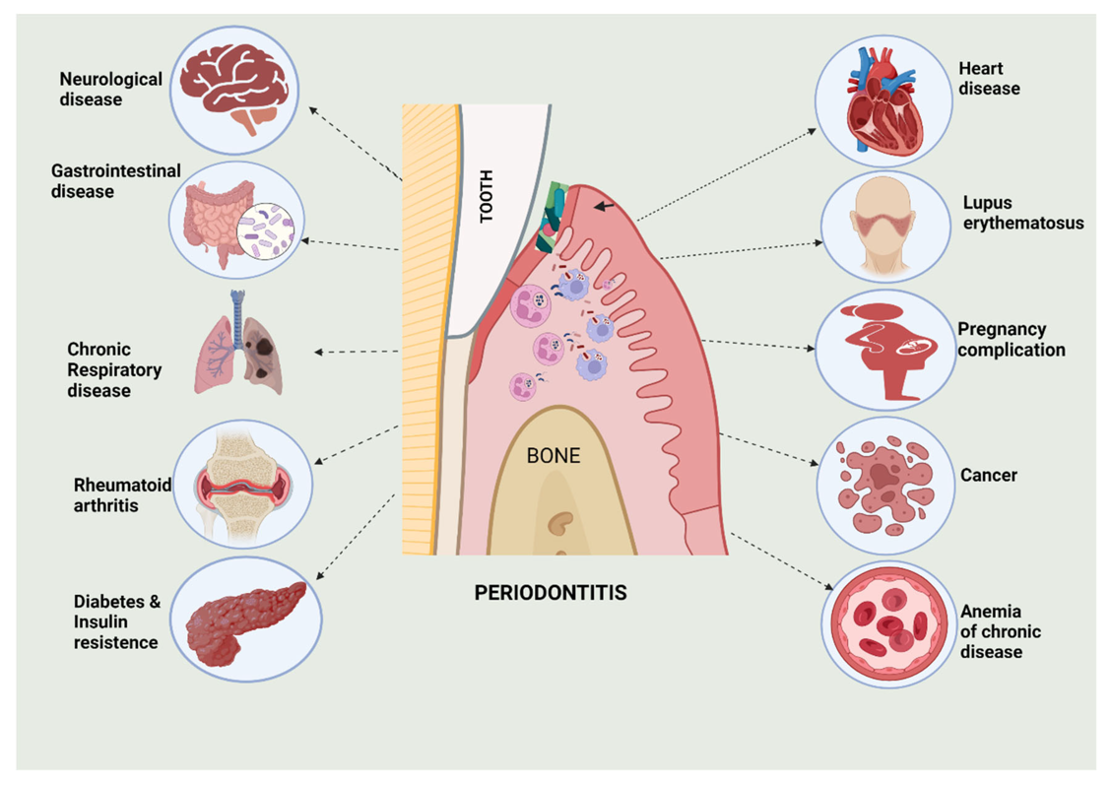Gum disease, or periodontal disease, often begins as a seemingly minor issue, such as bleeding gums or mild discomfort.
However, this common dental condition can have far-reaching effects beyond your mouth, potentially impacting your lungs and brain. Understanding these connections underscores the importance of maintaining good oral hygiene and seeking timely dental care.
In this issue, we will discuss how gum disease is not a localized condition, but can affect other organ systems, such as your brain and lungs.
Gum Disease and the Lungs
The link between gum disease and lung health lies in the close relationship between the mouth and respiratory system. The bacteria responsible for gum disease, such as Porphyromonas gingivalis, can travel from the oral cavity into the respiratory tract. Once there, these bacteria may contribute to respiratory infections, including pneumonia and chronic obstructive pulmonary disease (COPD).
When you inhale, bacteria from infected gums can be drawn into your lungs. This can cause inflammation and exacerbate existing respiratory conditions, especially in individuals with compromised immune systems. Research has shown that people with gum disease are at a higher risk of developing severe respiratory infections, which can lead to prolonged hospital stays and increased chances of death.
Gum Disease and the Brain
Emerging studies suggest a compelling link between gum disease and brain health. Chronic inflammation caused by periodontal disease is believed to play a role in the development of neurological conditions, including Alzheimer’s disease and other forms of dementia.
The mechanisms behind this connection involve the migration of harmful bacteria and inflammatory markers from the mouth to the bloodstream. These can cross the blood-brain barrier, a protective shield that typically keeps harmful substances out of the brain. Once inside, these pathogens and inflammatory molecules can damage brain tissue, impair cognitive function, and accelerate brain degeneration.
A groundbreaking study published in recent years identified the bacteria P. gingivalis in the brain tissues of Alzheimer’s patients. The presence of these bacteria was linked to increased levels of beta-amyloid, a hallmark of Alzheimer’s disease. This evidence points to a potential role of gum disease in triggering or worsening cognitive decline.
Prevention is Key
Maintaining oral health is not just about having a beautiful smile; it’s about protecting your overall health. Simple practices like brushing twice daily with fluoride toothpaste, flossing, and visiting your dentist regularly can significantly reduce the risk of gum disease and its associated complications.
Additionally, a balanced diet, avoiding tobacco, and managing chronic conditions such as diabetes can help prevent periodontal issues. For those already diagnosed with gum disease, seeking professional treatment is critical to minimizing its systemic effects.
Your oral health serves as a gateway to your overall well-being.
By prioritizing gum health, you’re not only preserving your teeth but also potentially safeguarding your lungs and brain from serious health issues. Take charge of your health today, starting with your gums.
Dr. Kendal V. O. Major is Founder and CEO of Center for Specialized Dentistry which is a comprehensive family dental practice operating in Nassau and Freeport. He is the first Bahamian Specialist in gum diseases and dental implants since 1989. He also is a certified Fast braces provider. His practice is located at 89 Collins Avenue, Nassau at (242)325-5165 or [email protected].

There is a clear link between germs from your gums traveling to the lungs

Many organ systems are affected by gum disease (Periodontitis)





